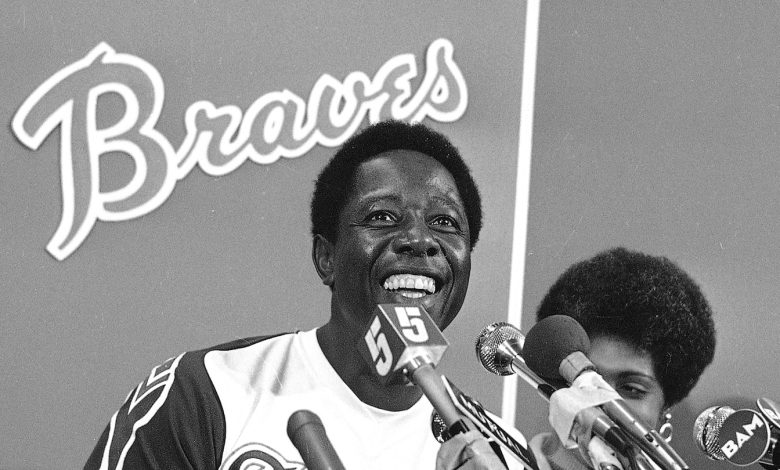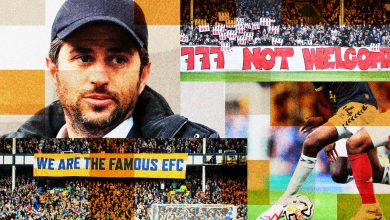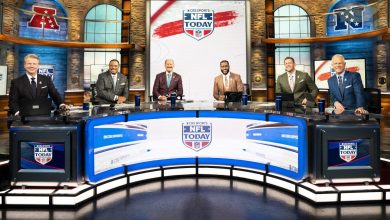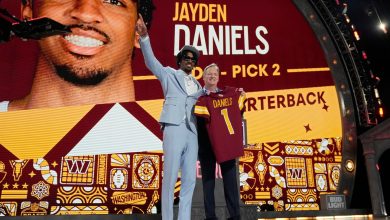Henry Aaron’s legacy lives on 50 years after home run record

Here stands an abandoned, neglected artifact of the moment April 8, 1974, when Aaron surpassed an almost mythical figure in Babe Ruth and cemented himself as a cultural icon. Nearly 30 years after Jackie Robinson broke baseball’s color barrier and showed a Black man belonged, Aaron shattered the most prestigious record in sports, showing a Black man could be the standard-bearer.
“It might be a ballplayer as good as him,” former teammate Ralph Garr says, “but nobody’s better.”
Trash cans greet a visitor at the marker in late March, only days before the city prepares to celebrate the 50th anniversary of the first time it was the center of the sports world. The paint on the wall behind the sign that reads “715” has faded. Aaron’s blue No. 44 — one wooden 4 atop another — is indistinguishable from the surrounding rubbish without a closer inspection.
The spot represents how much Atlanta and everywhere else has moved on from that blast. Aaron’s home run traveled 385 feet off his 33.5-ounce Louisville Slugger, and roughly the same distance away, just over the wall representing the since-demolished stadium, is the Olympic Cauldron Tower, which held the ceremonial flame lit by Muhammad Ali before the 1996 Summer Olympics.
Glance over to your right, and there are luxury apartments bearing the name Hank, underscoring the population boom the city has experienced since the Braves arrived from Milwaukee in 1966. The team would become a fixture in the Deep South, led by a Black man from Mobile, Ala.
Even as his pursuit of 715 brought unimaginable vitriol upon him and even as his triumph launched him into a realm of unassailable titans, Aaron didn’t want to be defined by a number. His power gave him the record, and his record gave him power, which he used to empower others and become a living monument to strength and perseverance.
“Athletes are not really celebrated for their legacy. They’re celebrated for their accomplishments. Sport — he transcended that,” says Allan Tanenbaum, Aaron’s longtime attorney and friend.
Aaron died three years ago at 86, and his power continues to have a hold — on the teammates he shared his greatness with, on the athletes who followed the pathways he mowed down and on the city he made a home until the end.
Dusty Baker was kneeling at the on-deck circle before Aaron took Los Angeles Dodgers lefty Al Downing deep, concluding what had become a taxing journey.
Aaron, who taught himself to play with a broomstick and bottle caps, was about to break a record that was set by a White man before the game was integrated. The attention Aaron received as he approached Ruth made him uncomfortable, mostly because he would rather not be bothered but also because his excellence infuriated racists.
He was no stranger to hateful behavior, having grown up in the segregated South. Andrew Young, the former mayor of Atlanta and U.N. ambassador and a longtime friend of Aaron’s, remembers Aaron telling him the story of playing across the street from their home in Alabama, when his mother, Estella, called on 12-year-old Henry and his siblings to come inside and get under the bed. She peeked out the window as the Ku Klux Klan rode by on horseback; she sent her children back outside once the mob was gone.
But the hatred and death threats nonetheless left Aaron shaken, particularly after someone threatened to kidnap his daughter Gaile. Baker and Garr could see the pain on his face when he would read a letter, ball it up and walk out of the clubhouse to be with his thoughts. Sometimes Baker would check the trash can to see what upset him.
Aaron already had won a World Series, a National League MVP award, four home run and RBI titles apiece and two batting crowns before Garr and Baker were called up to the majors in 1968. Baker says Aaron had always been “our protector,” fighting on behalf of his teammates when something wasn’t right, and this was their turn to shield him. “We tried to help him. Just stay loose and laugh,” Baker says. “Just be there for company. That was a lonely time.”
“The story goes,” Tanenbaum says, “that Ralph said, ‘Somebody’s shooting the bullet around here; it’s going to come through me first.’ ”
Garr points out that more people wanted to see Aaron make history than didn’t. But those letters were still coming, and Aaron still needed a bodyguard, Calvin Wardlaw, because threats on his life couldn’t be dismissed as idle when his last NL home run title came just months before Martin Luther King Jr., a friend of Aaron’s, was assassinated.
So after walking in his first at-bat of the Braves’ home opener, Aaron stepped to the plate in the fourth inning and told Baker, “I’m going to get it over with right now.”
Baker had no reason to doubt him. “He made up his mind,” he says.
Aaron rounded first into history, and two teenage fans joined him. Wardlow, having determined they were harmless, kept his .38 caliber pistol at his hip. After a long embrace from his parents and a full 11-minute pause to celebrate the moment, Aaron held the ball high for an adoring, sellout crowd of 53,775 that included Young, Sammy Davis Jr. and Pearl Bailey.
But the smile that spread across Aaron’s face didn’t necessarily reflect happiness. “It should have been a very joyous moment. It wasn’t,” Baker says. “It was more of a relief then than anything.”
That would be Aaron’s last season in Atlanta; he would return to Milwaukee to play the final two years of his career with the Brewers. Aaron retired as the all-time leader in home runs, RBI, total bases and extra-base hits. The latter three marks remain untouched, and even though Barry Bonds bested Aaron’s final tally of 755 home runs, only one number will resonate and reverberate for generations.
Baker says he never heard Aaron mention 715 after that night — not even to joke about how good he was.
“He taught us humility,” Baker says. “Being humble on the outside and cocky as you want on the inside.”
Life after baseball didn’t have to be a worry for Aaron because Ted Turner, the Braves’ new owner, had already promised him a place in the organization once he retired. Aaron held several front-office roles, including farm director when the Braves drafted Chipper Jones and Tom Glavine, core members of Atlanta’s first championship team in 1995.
“Henry Aaron’s blueprint is all over the Braves organization,” says Garr, who also returned to the franchise’s front office after he retired.
Aaron had become such a trusted adviser that Turner, who also owned the Atlanta Hawks, asked him about University of Georgia star Dominique Wilkins leading up to the 1982 NBA draft. Aaron’s response: “Get him by any means necessary.”
It was a testament to Aaron’s impact on Atlanta that the city he needed considerable convincing to leave Milwaukee for was such a desirable destination for Wilkins. Five years after 715, Wilkins’s family sought refuge from the small town of Washington, N.C., after his decision to commit to Georgia, he says, resulted in a cross burning on his front lawn.
Wilkins spent his entire college career dreaming of the chance to play for the Hawks. Utah drafted him third overall, but Turner heeded Aaron’s advice and traded for him. Atlanta’s growing reputation for being a city of opportunity, where Black professionals were thriving, made it attractive.
No other athlete had as much influence on Atlanta as Aaron, but Wilkins’s rim-punishing dunks made him a beloved figure, even though he never led the franchise past the second round of the playoffs. “Winning a championship doesn’t matter, the way the people treated me here and gave me that love,” he says. “The fans kind of made me their favorite son. So I never wanted to leave.”
Wilkins befriended Aaron as both became involved in raising money for the United Negro College Fund, a charitable organization that remains dear to Billye Aaron, Henry’s widow.
Other Black athletes had flashes of greatness in Atlanta, from Deion Sanders’s two-sport stardom for the Falcons and Braves to Michael Vick’s electrifying quarterback play before a dogfighting conviction interrupted his NFL career. Even if they never made the same connection with Aaron as Wilkins, it was impossible to play in the sports town he built without having appreciation and respect for him.
When Aaron died, Sanders referred to him as his “hero.” Aaron also had a hand in helping Vick get a second chance in football by writing a leniency letter to a federal judge on his behalf.
“Every star athlete here rode off of his back and what he’s done here in Atlanta,” Wilkins said.
But Aaron wasn’t above being inspired by others. Marquis Grissom, an Atlanta native and a member of the Braves’ 1995 championship team, had met Aaron during his college playing days. But they didn’t have much more than a cordial, handshake relationship until eight years before Aaron died, when he joined Grissom’s efforts to get more Black youth involved in baseball — offering advice on making the program more sustainable and impactful.
“People ain’t going to remember all the numbers, but they’ll remember you,” Grissom says, sharing a lesson he learned from Aaron. “It was almost like he was passing that torch to me.”
Grissom’s program, the Marquis Grissom Baseball Association, would help several kids reach their dreams of attending college — some played baseball, some didn’t — and he went on to become an instructor in one of MLB’s grass-roots programs to improve participation among Black players, now known as the Hank Aaron Invitational. There, one of the talented young players Grissom trained, Michael Harris II, landed on the radar of his hometown Braves, who would select him in the third round of the 2019 draft.
Harris was the NL rookie of the year after a surprising call-up in early 2022. The 23-year-old is now one of the best players on a perennial contender.
“[Aaron is] one of the first players you think of when you think about the Braves organization and how great he was,” Harris says. “I’m just trying to follow his footsteps.”
The marker in downtown Atlanta might not be cherished, but the man and the moment are — as 715 will be honored Monday with a forum featuring Baker, Garr and Tom House, the relief pitcher who caught the ball and rushed from the bullpen to hand it to Aaron.
“I don’t know if you can find a singular moment in all of professional sports that is as iconic and as well-known and talked about as the hitting of 715,” says Derek Schiller, the Braves’ president and CEO. “For a whole host of reasons.”
The Atlanta History Center will introduce an ambitious exhibit chronicling Aaron’s life through his words, rare memorabilia and some priceless materials. The exhibit will run through September 2025, allowing visitors to take in Aaron’s splendor though next season’s All-Star Game, which will be played, fittingly, on July 15.
Aaron’s influence on the city extends far beyond baseball. Young, the former Atlanta mayor, remembers standing outside a hotel on the day the Braves were welcomed to town with a parade. Young overheard a group of White “country boys” wearing overalls nearby cheering on “Hammerin’ Hank” as his vehicle passed by them.
“And then one of them said, ‘We’re going to have to be a big league town now, and that fella is going to have to be able to buy a house anywhere he wants to,’ ” Young, 92, recalled in a recent telephone interview. “And I was shocked.”
In the 58 years since Aaron gave Atlanta its first Black sports hero, it has developed into one of America’s preeminent cities — welcoming the Falcons of the NFL, the Hawks of the NBA and an ambitious expansion of its airport into an international hub.
“We saw big league sports as a means of becoming a big league town,” said Young, who added that “there’s very clearly a direct line” from Aaron’s achievements to the city’s growth. His record didn’t just elicit cheers; it tilted opinions about what Black people could accomplish.
“He was like God here, you know,” Wilkins says. “And still is.”
A higher power had to have had a hand in recent baseball history, if you ask those close to Aaron. In the first World Series after Aaron’s death, Atlanta won its second championship. The following year, Baker, while managing the Houston Astros, won his first — a sequence Garr believes is no coincidence.
“You have to look up to heaven and thank that man,” Garr says.
Apsny News English



